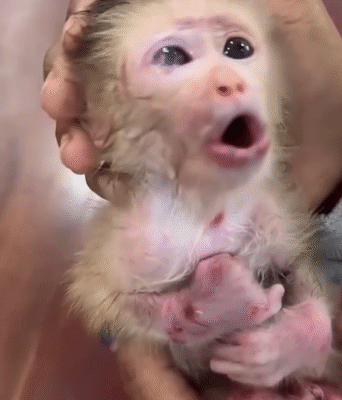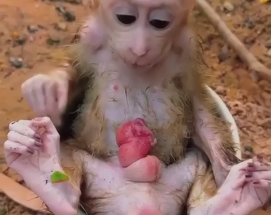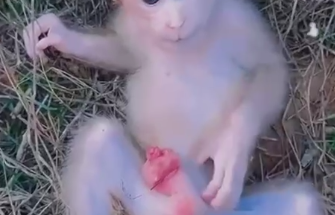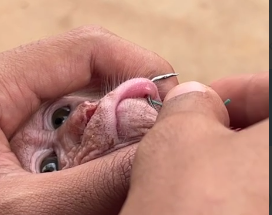In the shade of a trembling fig tree, hidden among rustling jungle leaves, a soft whimper echoed through the morning mist. A tiny baby monkey, no more than a few months old, curled up alone, his small chest rising and falling with shallow, fevered breaths. His eyes, once bright with mischief and wonder, were now dulled—one of them swollen, crusted, and clouded from infection. A broken eye.
His name was Tilo.
He had once swung from branches with abandon, chasing sunbeams and bugs, tugging on his mother’s tail with cheerful squeaks. But something had changed. The jungle, with all its vibrant life, had turned silent for Tilo. Fever had gripped his fragile body days ago, and with each sunrise, his strength faded further.
No one knew exactly how it started—perhaps a tiny wound, a scratch, or the bite of an unseen insect. The infection spread quickly, reaching his eye, then his little brain, twisting his balance and muddling his thoughts. He trembled even in the heat.
His mother, Dala, sat nearby, wringing her hands, her heart thudding in helpless panic. Monkeys are not known for tears, but if they were, Dala would have cried a river that morning. Her baby, her joy, now whimpered like a dying bird, too weak to cling to her fur.
The other members of the troop watched from a distance, unsure of what to do. Monkeys live in groups, but they often don’t know how to help the sick. Some looked away. A few moved closer but turned back when the smell of sickness touched their noses. The jungle was harsh, and nature cruel. Even among kin, survival often triumphed over sympathy.
But Dala stayed. She groomed his fur, though his fever made him flinch at every touch. She murmured soft grunts, low and rhythmic, a lullaby from one mother to one child.
Still, the fever did not break.
And the eye—oh, the eye. It had once gleamed like a polished acorn, now it bulged and swelled, a grotesque reminder of how quickly a tiny creature could fall.
It was then that a noise came from the bushes.
A human.
A rescuer.
Jina, a forest volunteer who’d been monitoring the troop for weeks, heard the cries through her binoculars. She had seen Tilo before—lively, cheeky, always at his mother’s side. But now, her heart sank as she spotted the limp figure at Dala’s feet.
She approached slowly, careful not to startle them. Dala bared her teeth at first, shielding her baby with her small body. But she did not run. She could sense the urgency in Jina’s movements, feel the waves of concern radiating from the human’s scent. Dala looked down at Tilo, then back up—eyes meeting eyes—and in that shared moment of maternal desperation, she allowed it.
Jina reached out with gloved hands and scooped Tilo into a warm towel. His body, hot and fragile, barely stirred.
She rushed back to camp. IV fluids. Antibiotics. Cool compresses. A quiet room with no predators, no flies, no fear.
Every hour was a battle.
His little fingers twitched on the second night, then curled. By morning, he made a small sound—like a hiccup, then a chirp.
Hope. Just a flicker.
But the eye remained bad—too far gone. The vets agreed: it had ruptured from the swelling. Nothing could be done to save it. They removed the infected tissue carefully, leaving a stitched seam where once his world had been whole.
He survived.
Tilo, now one-eyed, slowly regained strength. His grip returned. His appetite, too. And even though he stumbled at times, his spirit came back, fierce and playful.
Dala was brought into the rehab enclosure weeks later. The reunion? Nothing short of a miracle. She rushed to him, hooting and chattering, pressing her forehead to his with relief. He responded with a soft purr and tugged her ear gently, just like before.
The troop would not take him back now—not easily. A monkey with one eye? Vulnerable. Different. But in the rescue center, he had a chance. To heal. To play. To live.
Jina watched from outside the mesh, tears in her eyes.
It was a story she would tell often.
How one baby monkey got a fever so bad it broke his eye.
How a mother monkey refused to leave his side.
How a human intervened, not to tame, but to save.
And how, against all odds, the smallest life fought to survive.
Epilogue
Years later, Tilo became an ambassador for forest conservation. Not with speeches, of course, but with his spirit. Children would visit the sanctuary and learn about his story. One eye, but full of life. A reminder that every creature, no matter how small or sick or broken, deserves a chance.
And in the deepest part of the jungle, near the trembling fig tree, his story echoed in whispers between leaves. Not of pity, but of courage.



